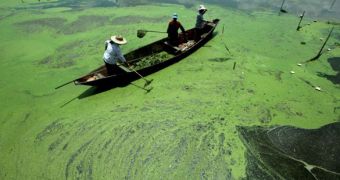The Canadian Journal of Fisheries and Aquatic Sciences recently saw the publication of a new study focusing on the dangers posed to public health and natural ecosystems by the amounts of nutrient pollution found in the country's freshwater sources.
Thus, scientists warn that, as a result of human-driven nutrient pollution, Canada's lakes are now experiencing a boom in their blue green algae population, something that an very easily translate into negative effects for local fish species, the need to push for more efficient and more costly treatments for drinking water, and health issues for the people who spend considerable amounts of time close to these water sources.
NRC Research Press quotes Dr. David Kinniburgh from the University of Calgary, who explained how, “Blue-green algae present a growing health concern for domestic, agricultural and recreational water use in Canada and world-wide.”
Furthermore, “The microcystin toxins they produce can cause acute liver failure in humans and may even cause cancer with long-term exposure.”
Diane Orihel from the University of Alberts backs up his statements, arguing that, “Canadians enjoying their summer at the cottage need to know that those green scums of algae washing up on their beach are not only unsightly, but can also be a threat to their health and their children’s health.”
Apparently, the lakes and reservoirs in central Alberta and southwestern Manitoba are the ones presently displaying the highest concentrations of microcystin, and therefore are the one local authorities and high officials need to clean up as soon as possible.
However, as Dr. David Kinniburgh pointed out, the issue of nutrient pollution and its effects on natural ecosystems could soon grow to be a worldwide problem, especially given the fact that most of the activities presently carried out by human society ultimately influence and alter the chemical profile of the water sources we have at our disposal.
As specialist Diane Orihel puts it, “It’s time to get serious about cleaning up the nutrients polluting our lakes.”

 14 DAY TRIAL //
14 DAY TRIAL //